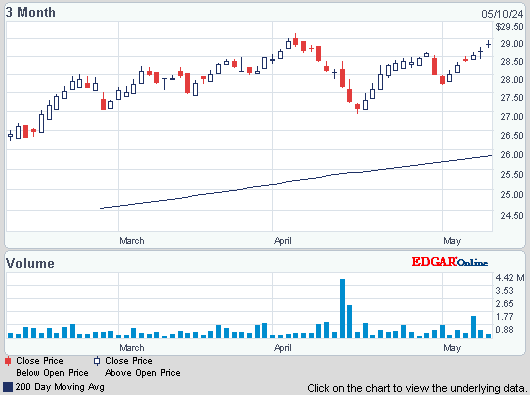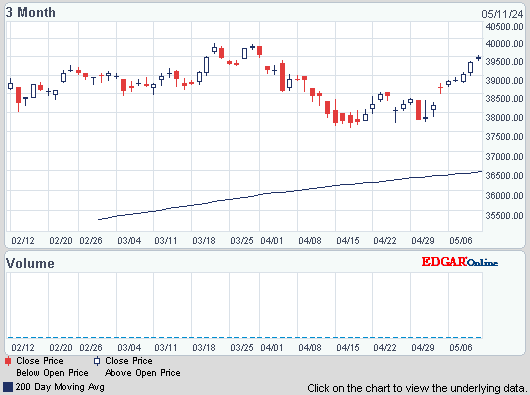Dow fell 94, decliners over advancers 4-3 & NAZ went down 5. The MLP index was fractionally higher while the REIT index was fractionally lower. Junk bond funds were mixed & Treasuries gained, taking yields lower. Oil & gold did little.
AMJ (Alerian MLP Index tracking fund)

Fewer Americans filed applications for unemployment claims last week, a sign the labor market continues to strengthen. Jobless claims decreased 2K to 326K.the least since the end of Nov, from a revised 328K in the prior period, according to the Labor Dept. The forecast called for 328K. The 4 week average of jobless claims declined to 335K from 348K. The number receiving extended benefits under federal programs rose 63K to 1.35M in the last week of the emergency unemployment compensation. Gains in business & consumer spending are boosting growth prospects, allowing employers to hold the line on firings in anticipation of stronger demand. Fewer dismissals typically precede a pick-up in hiring, as companies take on more workers to help production keep pace with improving momentum in the economy. Initial jobless claims reflect weekly layoffs & typically wane before job growth can accelerate.
Jobless Claims in U.S. Fall to Lowest in More Than a Month
Photo: Bloomberg
In Jan, confidence among US homebuilders held near its highest level in 8 years, indicating the residential real-estate market will continue to contribute to economic growth in 2014. The National Association of Home Builders/Wells Fargo builder sentiment gauge fell to 56 from 57 in Dec (readings greater than 50 mean more respondents report good market conditions). The forecast called for 58. Home construction has been a source of strength for the economic expansion, propelled by job gains & rising property values. The market has weathered rising interest rates & prices are forecast to continue to rise this year. But the group’s measure of the 6 month sales outlook declined to 60 from 62 & a gauge of prospective buyer traffic decreased to 40 from 43 last month. The index of current single-family home sales fell to 62 from an 8 year high of 63 in Dec. Builder confidence fell in 2 of 4 regions, led by a 7 point drop in the South. The index also fell in the Midwest & rose in the Northeast & West.
Photo: Bloomberg
ECB Executive Board member Benoit Coeure said banks may not need another round of the cheap long-term loans that were key to fighting the euro-area debt crisis & recession. “It may be the case that the standing facilities are enough to ensure an appropriate level of liquidity; if this is not the case, then we would act,” Coeure, who responsible for money markets at the ECB, said. “Tail risks are much more limited today than six months ago. So to that extent, we’re more confident in the recovery.” Coeure’s stance signals the ECB sees a day when financial markets can cope without the long-term refinancing operations, or LTROs, that warded off a credit crunch 2 years ago. At the same time, he stressed that the central bank is still guaranteeing lenders as much short-term cash as they need until at least Jul 2015, after the current 3 year loans expire. “There is not enough recognition in the market of the power of the fixed-rate, full-allotment regime,” Coeure said, referring to the bank’s crisis-era policy of meeting all demands for liquidity. “That’s an important backstop for the market and that worked effectively at the end of last year.” He said the importance of the backstop was illustrated in Dec, when overnight borrowing costs for banks surged to the highest level in 2 years. He said institutions coped by accessing standard ECB refinancing facilities that offer cash for periods from one week to 3 months, signaling that they’re now better able to withstand temporary shocks. We had very tight liquidity and elevated Eonia and Euribor rates; that’s something we wouldn’t like to see as a permanent situation,” said Coeure. “It’s not new that we’ve been worried by possible upward shifts in our money-market curve.”
Today's slide in stock prices means little in a market that is vastly overbought. In the last 12 months, Dow is up a staggering 3K with hardly a hiccup along the way. Maybe the bulls are beginning their long weekends early, eager to spread some of their wealth around. But there is plenty to worry about including the Chinese economy which is reporting slower growth & a dysfunctional DC that has to raise the debt ceiling once again.
Dow Jones Industrials

AMJ (Alerian MLP Index tracking fund)
Treasury yields:
U.S. 3-month |
0.03% | |
U.S. 2-year |
0.39% | |
U.S. 10-year |
2.85% |
| CLG14.NYM | ...Crude Oil Feb 14 | .............93.84 | (0.4%) |
| ZGG14.CBT | .....Gold 100 oz. Feb 14 | ...1,252.70 | (1.1%) |
Fewer Americans filed applications for unemployment claims last week, a sign the labor market continues to strengthen. Jobless claims decreased 2K to 326K.the least since the end of Nov, from a revised 328K in the prior period, according to the Labor Dept. The forecast called for 328K. The 4 week average of jobless claims declined to 335K from 348K. The number receiving extended benefits under federal programs rose 63K to 1.35M in the last week of the emergency unemployment compensation. Gains in business & consumer spending are boosting growth prospects, allowing employers to hold the line on firings in anticipation of stronger demand. Fewer dismissals typically precede a pick-up in hiring, as companies take on more workers to help production keep pace with improving momentum in the economy. Initial jobless claims reflect weekly layoffs & typically wane before job growth can accelerate.
Jobless Claims in U.S. Fall to Lowest in More Than a Month
In Jan, confidence among US homebuilders held near its highest level in 8 years, indicating the residential real-estate market will continue to contribute to economic growth in 2014. The National Association of Home Builders/Wells Fargo builder sentiment gauge fell to 56 from 57 in Dec (readings greater than 50 mean more respondents report good market conditions). The forecast called for 58. Home construction has been a source of strength for the economic expansion, propelled by job gains & rising property values. The market has weathered rising interest rates & prices are forecast to continue to rise this year. But the group’s measure of the 6 month sales outlook declined to 60 from 62 & a gauge of prospective buyer traffic decreased to 40 from 43 last month. The index of current single-family home sales fell to 62 from an 8 year high of 63 in Dec. Builder confidence fell in 2 of 4 regions, led by a 7 point drop in the South. The index also fell in the Midwest & rose in the Northeast & West.
ECB Executive Board member Benoit Coeure said banks may not need another round of the cheap long-term loans that were key to fighting the euro-area debt crisis & recession. “It may be the case that the standing facilities are enough to ensure an appropriate level of liquidity; if this is not the case, then we would act,” Coeure, who responsible for money markets at the ECB, said. “Tail risks are much more limited today than six months ago. So to that extent, we’re more confident in the recovery.” Coeure’s stance signals the ECB sees a day when financial markets can cope without the long-term refinancing operations, or LTROs, that warded off a credit crunch 2 years ago. At the same time, he stressed that the central bank is still guaranteeing lenders as much short-term cash as they need until at least Jul 2015, after the current 3 year loans expire. “There is not enough recognition in the market of the power of the fixed-rate, full-allotment regime,” Coeure said, referring to the bank’s crisis-era policy of meeting all demands for liquidity. “That’s an important backstop for the market and that worked effectively at the end of last year.” He said the importance of the backstop was illustrated in Dec, when overnight borrowing costs for banks surged to the highest level in 2 years. He said institutions coped by accessing standard ECB refinancing facilities that offer cash for periods from one week to 3 months, signaling that they’re now better able to withstand temporary shocks. We had very tight liquidity and elevated Eonia and Euribor rates; that’s something we wouldn’t like to see as a permanent situation,” said Coeure. “It’s not new that we’ve been worried by possible upward shifts in our money-market curve.”
Today's slide in stock prices means little in a market that is vastly overbought. In the last 12 months, Dow is up a staggering 3K with hardly a hiccup along the way. Maybe the bulls are beginning their long weekends early, eager to spread some of their wealth around. But there is plenty to worry about including the Chinese economy which is reporting slower growth & a dysfunctional DC that has to raise the debt ceiling once again.
Dow Jones Industrials











No comments:
Post a Comment